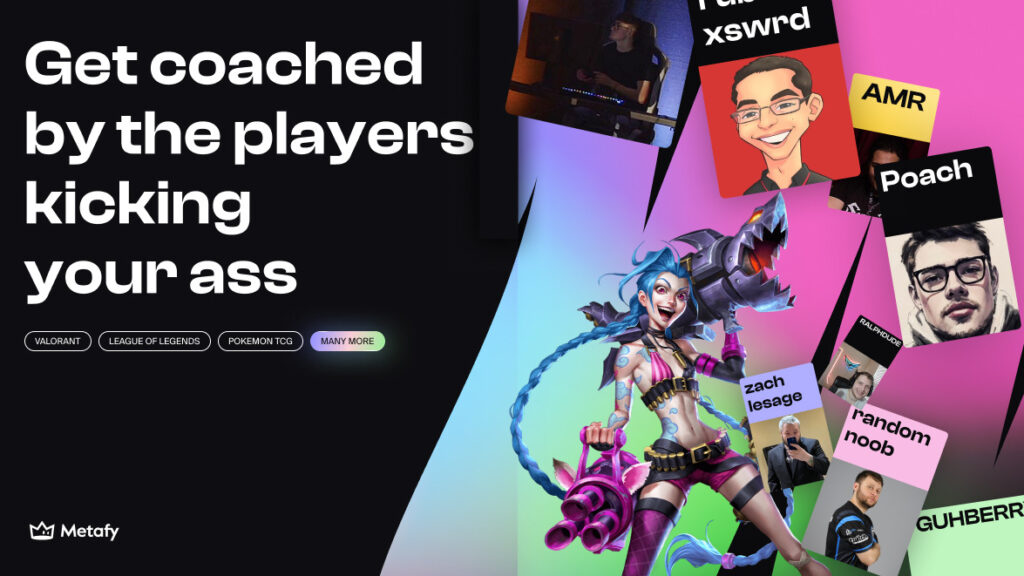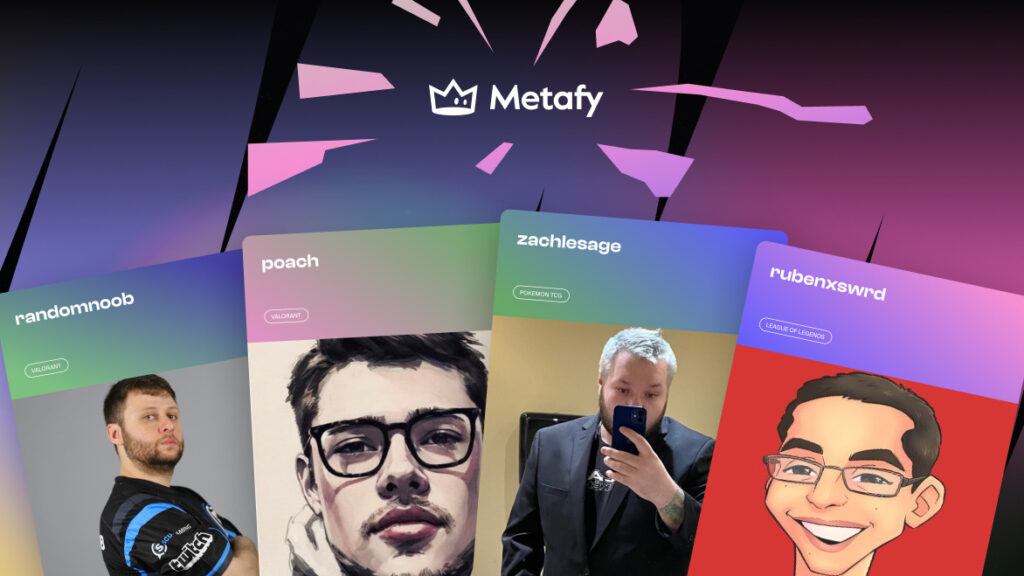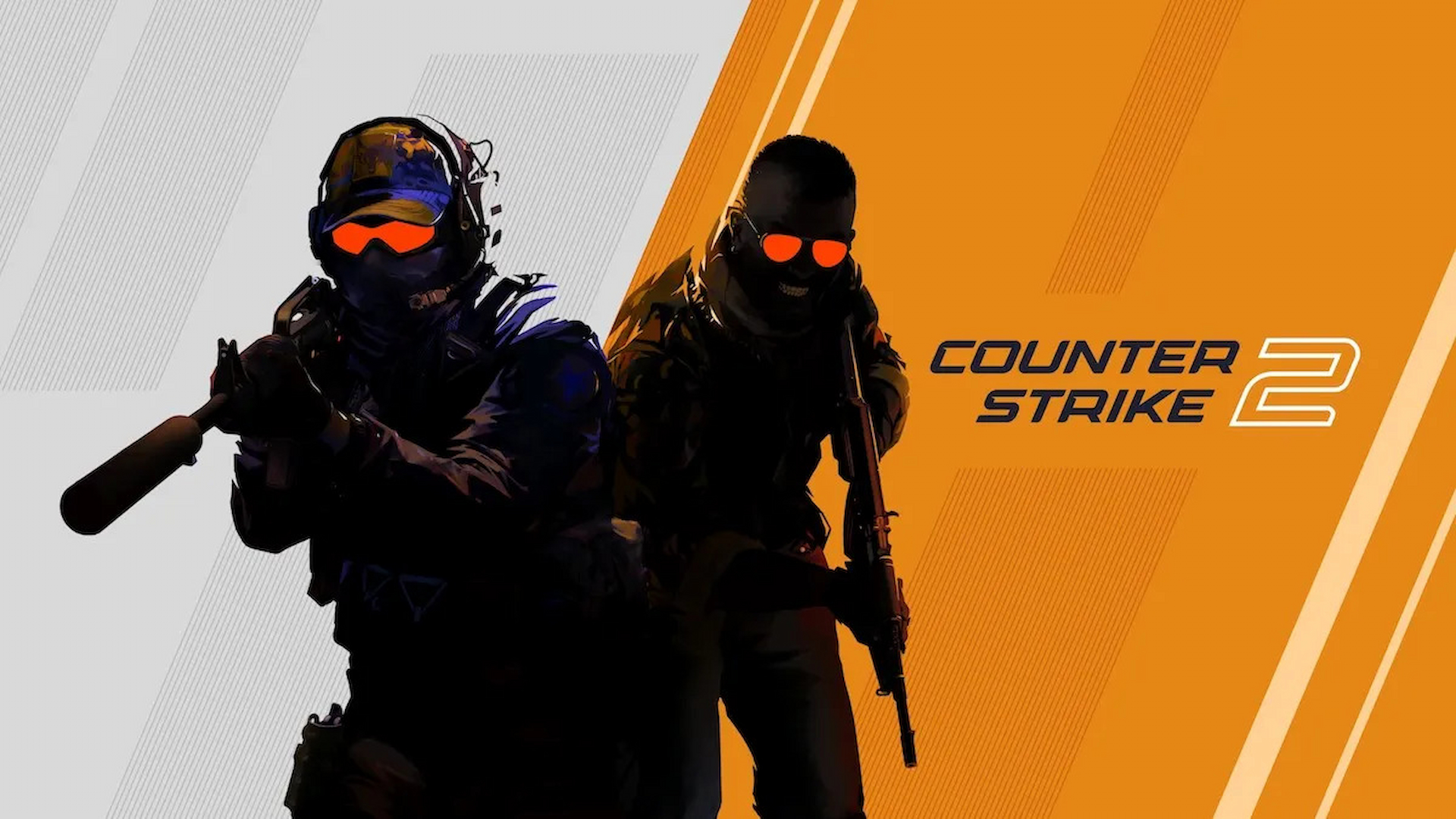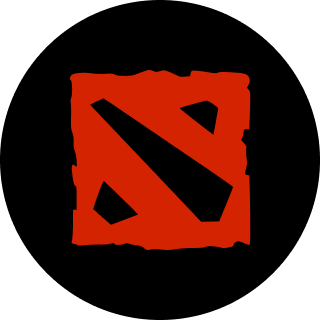Class is in session as we interview top esports coaches across VALORANT, League of Legends, and Pokémon, thanks to Metafy!
In esports, coaching has become a vital part of the process of winning. But what is it like coaching esports at the professional level? And what does it take to reach the highest levels of coaching and competition? Esports.gg sat down with four professional esports coaches for League of Legends, VALORANT, and competitive Pokémon TCG, all from the Metafy platform, to talk about coaching.
They gave us insight into their coaching styles and even offered some tips on how to rank up in their respective games, or what to do if you’re looking at going pro. A big thank you to Metafy for the chance to interview these professional esports coaches. Read on to find out more!
What makes a good esports coach?

Ruben 'Xswrd' (League of Legends): "The best type of coach is the kind of coach who can answer any questions logically, in a way your student can understand. A really good coach is someone who can be direct without making you feel like you aren’t making progress. Students take progress as climbing straight up, but progress is a process and not a direct path to the top."
"A good coach is someone who can help you understand, who puts you in a mentality where you know it is a process and that the process will be different for everyone and will take time. A coach is someone who actively believes in you, that failure doesn’t really matter, and that messing up is part of being human. They help you trust yourself and your own path. Someone who can be kind, treats you with respect no matter the situation, no matter how frustrating it is for someone to teach someone, who has no problem with attitude, and will listen."
"As long as you can make the student understand this is consistency, it’s a process, and forgiving yourself is important, especially because a lot of people are bad at taking feedback. If you have a bad game, that doesn’t define you. A good coach is someone who can teach you patience and self-discipline.
"Coaches are enablers for you to become the best version of yourself. To help you understand if you aren’t sleeping well or struggling to eat well then it will be harder. Your body has to be functioning well to process the whole process of progress. A lot of factors can affect your performance: Such as family relationships, etc. They should be able to coach you IRL too because all these can affect performance. Students go through stuff. They’re all human. Someone who can help you feel better about yourself even if you’re not improving rapidly."
Zachlesage (Pokémon TCG): "A solid coach is someone who has a deep understanding of what the game is that they're teaching. So in Pokémon it's easy to attach energies, easy to evolve, play trader cards, to play at a basic level. Players can instantly understand it from playing it or reading a rulebook, anything that gets you into the game. But deeper understanding like core mechanics that aren’t listed, identifying missing prize cards, playing cards and in a certain order, you can't make those up as you go along. You need to understand those things to teach those things."
"On top of a deep understanding of the game, you need a deep understanding of what the coaching client/student is looking for and tailor the sessions to what they need. If they don’t know what they're looking for, then having something structured to help them see their growth. Very similar to a tutor in any subject. I'm a Pokémon tutor – and that means being able to create a warm welcoming environment and balancing that with serious work."
"I would tell people, to follow their dreams no matter how hard they think it is, it's always possible as long as you think it's possible and as long as you seek the tools you need – coaching someone to tell you: "you can do it!""
Randomnoob (VALORANT): "To be the best coach you can be, they can identify what people need at their core the most in that moment only focus on those things and only help them with those. People often expect everything to be better in each moment, but in reality, it is to work on specific things. And the best coaches know what to work on – mindset, mechanics, game sense, being a better teammate, being a better person, having a better routine. Everyone's life and their routine has to be special to them, you have to be able to give things to people that are unique and special to them. Things that are for them only, not for anyone else or a copy-paste."
POACH (VALORANT): "Somebody that can identify strengths, weaknesses and use them to their advantage. A great coach is honest with their students, sugar-coating halts progression, and at the highest level its important to be honest with yourself, because if you wanna get better you have to be willing to set aside your ego."
What are the skills you need to go pro?
Ruben 'Xswrd' (League of Legends): "I would highly suggest if it's your first time starting or wanting to [go pro], you should get coaching ASAP. Preferably off a player who already competed. It's different to teach the game from competitive perspective compared to someone who plays solo queue."
"Smurfing is bad because you create bad habits because you're not getting punished for something you'd normally get punished for. Respect the same timings you would normally respect, play with information and that will help you perform at the highest level, at a faster pace than you normally would. League is like chess, the most important resource on LoL is tempo, the opportunity you can use to be faster on the next play – windows of opportunity to make the next play before your opponent, be one step ahead, is all about timing."
Zachlesage (Pokémon TCG): [on going pro] "Look for opportunities. If you are looking towards teams or sponsorships, knocking on a door and getting told "no" 100 times and one "yes," from 100 different sponsors is still good, because you still got a "yes." That is better than getting a no or not trying at all."
"It's not always a case of being poached or being looked for: Some opportunities are created, some opportunities kind of fall into your lap. A lot of the time you have to be proactive and be your own biggest supporter. In a world where competitive games only have one winner, even if you're on a team, you have to believe in yourself. Don’t let the haters get you down. Networking can be a good starting point because you never know when an opportunity will come; like rooming with someone at an event. Use your own judgment but you never know."
"Knocking on a door and getting told "no" 100 times and one "yes," from 100 different sponsors is still good, because you still got a "yes," because that is better than a no or not trying at all."
Randomnoob (VALORANT): "Understand that life is about the journey, enjoy the journey. Focus on one thing at a time, get really good, and then focus on the next thing. Then keep doing that till you’ve got everything, and then repeat so you master it within an inch of its life."
POACH (VALORANT): [to go pro] "Play smaller tournaments, succeed, do well, play as many tournaments as possible, be high up in Radiant, and get your name out there. If you are younger, get into collegiate programs. 200 collegiate VALORANT teams in the USA offer full rides for students at Radiant level. Kids right out of high school can get college paid for out of VALORANT, and then the pro teams will farm from those collegiate teams and programs."
[on general improvement] "You need to develop an aiming time for warm-ups, don’t autopilot through warm up. Aim labs, range, etc. don’t switch those up, create consistency and muscle memory, keep it consistent on how you warm-up. Figure out what you like to warm-up, and do that every day or before ranked, to create muscle memory, and create the same mindset every time. Be that 10 minutes on aim labs, 20 minutes in the range, and then go into game. Keep consistent – consistency is dependent on the situation. But for aim in particular, although it's not as big of a deal as people make it out to be, you can't instantly get better. It’s a development thing and needs consistency!"
What are the most important skills to focus on in your game?
Ruben 'Xswrd' (League of Legends): "Discipline. And understand what your role is in the game and what your role is in LoL. Timing: The timing for killing opponents, become responsible and understand what you need to do every time: Dive into comp, straight up farm here, kill the ADC, TP to bot, you can go for an all in, an outplay. Be responsible for your actions and the outcome you create."
"Discipline is extremely important alongside being able to communicate. Communicate with pings, body language (which I develop on students, the way you click says a lot about how you think, feel, and what you want to do), how to approach plays, and typing in the chat – you have to express your ideas. Or just be able to question ideas too. Play for other parts of the map if you have a losing lane. Try to minimize losses, and trade for what you can, especially for cases such as bot lane."
"Understand how to trade. Not about saving, but trading for their lead so it can be picked back up later."
"Logical understanding, to understand how your matchup affects the other matchup. So they have Kai'sa, how do we kill Kai'sa? When should we play safe against Kai'sa? What should you be doing? That kind of discipline puts you in greater spots."
"Sometimes mechanical practice is also important. For example playing top against Camille. How did you win? Or why did the other guy win? These factors are incredibly important to think about because then you can determine what condition the lane is in. Sometimes it's more logical than just going all in – it’s a factor people don’t think about when playing."
"A lot of people target the wrong things. You see it a lot in coaching: Lose fights, and blame the aim or not recognize/think aiming is why they're being held back. Not about aim alone, more about how you position, take fights, what advantages you have with utility and teammates"
Zachlesage (Pokémon TCG): "The most important thing to understand at any given point is the metagame, having an understanding of what decks make up the current standard format, decent understanding of the top 10 to 20 decks depending on which format you need. Then you can properly assess matchups, and stay on top of all the changes on a micro level, day-by-day. If you are playing a top deck you are usually doing pretty well. Tech cards can change and you don’t want to be caught with a tech card that is outdated, something that may not work or isn’t in your deck, but you don’t want to be without one if there is a new meta change or new deck. That kind of knowledge can beat a lot of resources."
"Pokémon is a very open game. Top player decks can be online minutes after a tournament finishes. How you play and understand them is the advantage, that’s the best way to see success – expand your understanding, don’t play just any game with anyone. Try and find people to play with who are the same or above your skill level. It's not always possible, but that’s where coaching can come in."
Randomnoob (VALORANT): "I would say 10% gunplay, 10% movement and dodging shots as much as hitting them, AKA, make yourself hard to hit, 50% mentality and mindset, 30% decision making and utility."
POACH (VALORANT): "A lot of people target the wrong things. You see it a lot in coaching: Lose fights, and blame the aim or not recognize/think aiming is why they're being held back. Not about aim alone, more about how you position, take fights, what advantages you have with utility and teammates – VALORANT is a lot more involved than that, 70% on teamplay and utility 30% on aim. No advantage in the fight, you are doing something wrong. Don’t rely on aim. How can you create an advantage, crosshair interruption, flashing, playing an off angle, through utility. Games can come down to economy, and managing economy is important to learn. Understand what the other team has economy-wise, and what you have, and how you can play to the strengths of your economy. Same for ults. How you can make a play based off theirs or use yours."
Related articles
What starting characters/decks should players learn?

Ruben 'Xswrd' (League of Legends): "For Top I will highly suggest: Garen, Ornn, Malphite. Jungle I suggest: Jarvan IV, Nocturne, Zac. Mid I suggest: Annie, Vex, Pantheon. ADC I suggest: Tristana, Varus, Jinx. Support I suggest: Lulu, Blitzcrank, Leona."
Zachlesage (Pokémon TCG): "I recommend any of the Pokémon League battle decks - They are based on top-tier decks that are usually from a couple of months ago, and a few new ones get released once a year. A League deck released a few months ago is a ready-to-play top-tier deck that could go to most tournaments and stands up well. Not just gonna show up and get whooped. These decks have a chance, but depending on the cards in the deck, you might want two copies because there can be thinner lines than top-tier competitive decks. Pick up a few League battle decks, they give you a large jumpstart, beyond that pick up singles to complete decks is probably the next best thing, a new v max deck. A couple of singles and creating decks based on that is good for competition."
Randomnoob (VALORANT): "Whatever agent you have the most fun on, whatever you think looks like the most fun to play in that game and that map."
POACH (VALORANT): "Any sort of initiator or controller – to teach you multiple parts of the game. With controllers you have an understanding of how defensive and offensive smokes are used to attack or defend the site. It teaches you how to communicate to use ultimate with other teammates, timings of smokes and so on. Initiators important to learn how to use intel, utility – knife, dog, drone, teaches how to get info on the game and how to use that info to make better decisions. If you don’t start on these, it can take longer to understand that info utility. Controllers can make it slower to understand how they can control the map itself."
"Ascent is the most basic map in the game, no gimmick – easy to early on understand how a map flows, and basic rotations, and easiest to apply ideas to – but because each map has a gimmick and maps don’t play the same, you cant apply the same logic and idea to every map."
What is the best thing about being an esports coach?
Ruben 'Xswrd' (League of Legends): "Being able to get the best out of people, to be straight up that person who puts a smile on their faces when they perform on their fave champion, it's way too good for me. Being able to help them, see them smile, hey you know what you did it even when you thought you couldn’t. "
"The wholesome part of coaching which motivates me to just go in every day, by working together and helping them do what they thought they couldn’t. If you push through, sometimes people just need someone to have a little faith in them, and being able to create that faith in them makes me happy."
Zachlesage (Pokémon TCG): "Its really fulfilling when you’ve had a great session, not every single session will be fantastic but a lot of it can go on our mood, certain meta game, and changing meta, but sometimes you have sessions that were amazing, super strong understanding after, you feel really good after it."
"Being able to get the best out of people, to be straight up that person who puts a smile on their faces when they perform on their fave champion, it's way too good for me."
Randomnoob (VALORANT): "The best thing is to play the game I love, help people get the best out of themselves, enjoy every day of my life doing something I love."
POACH (VALORANT): "Being able to improve at the game at a different level, always used to focus on just playing and done VOD reviewing other pro teams too. Just focusing on that part of the game has changed my own play. I've watched so many different players, I can recognize different tendencies and patterns which I could only recognize through coaching. It has added another level to how I approach competitive play now. Improvement as a player which is one of the reasons VOD review is such a big deal. VOD review is so important, if you don’t VOD review you'll never understand certain mistakes, tendencies or plays if you don’t go back and watch that – helps me understand how to understand my own VOD review and VOD review on other teams. The reps and consistency – I understand more and more of the game than I did as a player."
What advice would you give someone wanting to become an esports coach?
Ruben 'Xswrd' (League of Legends): "You need to learn and know how to answer all questions because LoL is a vast game, and a coach cant only teach one thing. There's a million ways of winning soloqueue but how do you want to win soloqueue. Playstyle, character, aggression, conservative. Someone has to be able to answer all questions. How could I win this match? You have to be able to answer all. Must have credibility and experience to be able to coach. You have to show your credibility, mechanics, play and teaching style. I'm a people person and I love to talk I love esports I can't imagine a better job for myself, fundamentally, it's all about passion."
Zachlesage (Pokémon TCG): "For anyone who wants to become a coach, understand what you want to coach. If it's Pokémon, you need to understand and know your information like the the back of your hand. Plus you need to be good at finding answers. I won't know everything all the time: A new card could release or a structural change in different regions that you don’t exist in. Asia region has a different structure to the other region. You gotta be able to think on your feet, know where to search things out, be a people person, you'll meet a lot of people when it comes to coaching and especially when you get good."
"Different people and different minds will work differently, you have to be able to adapt to whatever your client's needs are. Finding your niche, it’s a really good one to have, you don’t have to be a catch-all coach. For Pokémon you could excel in deck-building, or showing how to play this certain matchup, or I'll show you how to properly identify win conditions. There are different areas you can focus on. But don’t focus on areas you yourself are not particularly strong on, focus on where your strengths are."
Randomnoob (VALORANT): "Start coaching, coach friends, and loved ones, and start helping people get the most out of themselves. At the core of coaching it's about getting the best out of you for others, might be helping a friend have more fun, etc. Why do we stress about other stuff? Live in the moment or with family and how to be the best student/sister/brother. Figure out how to get the best out of yourself so you can share that experience with others."
POACH (VALORANT): "It's important as a coach to have a fundamental understanding of the game, take time to understand current metas, and how you can adapt as a player or coach. Leaning into staying up-to-date, watch pro VODs, why pros do what they do and be able to explain it and not just go through the motions of blanket feedback that doesn’t apply to everyone."
Final thoughts on esports coaching

Ruben 'Xswrd' (League of Legends): "I would tell people, to follow their dreams no matter how hard they think it is, it's always possible as long as you think it's possible and as long as you seek the tools you need – coaching someone to tell you: "you can do it!" Do not give up, encourage yourself to do what you do and live off it, and not take the easy path for living. That’s one of the most beautiful things about life, do what you want and do what you love for a living, I'm blessed with what I get to do, I love it, if I had to go through every precarious situation, where I didn’t eat well or sleep I totally would. To be here doing this."
Zachlesage (Pokémon TCG): "Shout out to the Shuffle Squad – the team I manage, and pro member for them too. Been having a good 2022-23 season, and they’ve definitely helped me improve as a person, a player, and as a manager. It's been a passion project, and I really like where we are at right now. If anyone is trying to be a coach, try it out. It's worthwhile to see if its something that you excel at. You might not be able to get on Metafy right away – depending on the game, you need a lot of credentials to do that. But that doesn’t mean you can't be a coach. Start by helping friends or kids at a Pokémon league, give away a few free sessions, etc."
Randomnoob (VALORANT): "Just believe in yourself, if you truly believe in yourself, why not?"
POACH (VALORANT): "There is still a massive gap in esports in coaching, there are not tons of coaches to begin with, but there are also tons of people that want coaching and are dying to get into [the pro scene]!"
All of the coaches interviewed are available for private esports coaching sessions via Metafy. Metafy is an online platform where you can book private coaching sessions with players at the top of their game. This includes pro players, top esports coaches, streamers, and more! Go to their website for more details and book yourself a coach!
Follow esports.gg, and keep your eyes locked on the site for all the latest esports news and updates.


